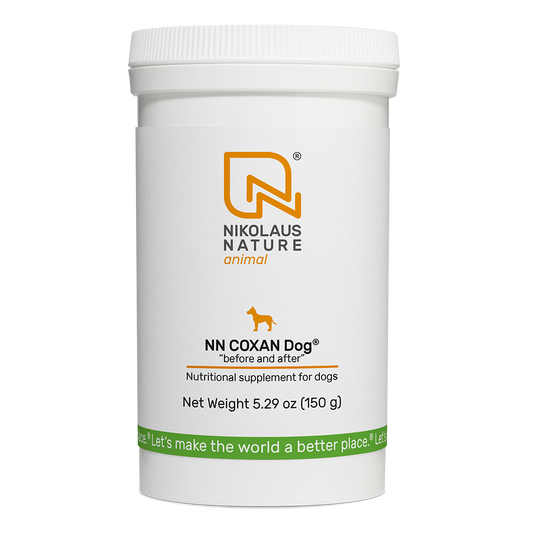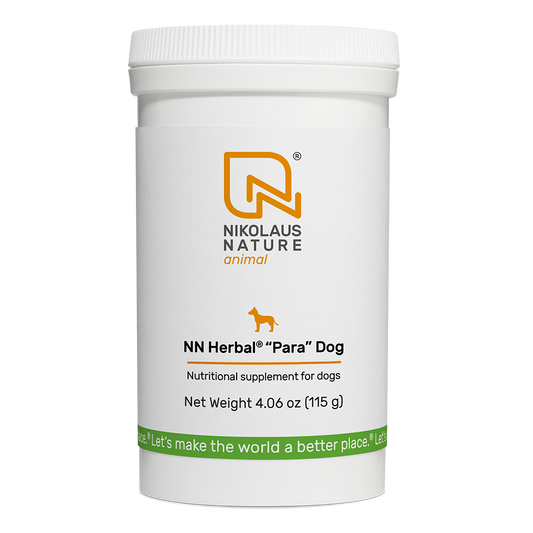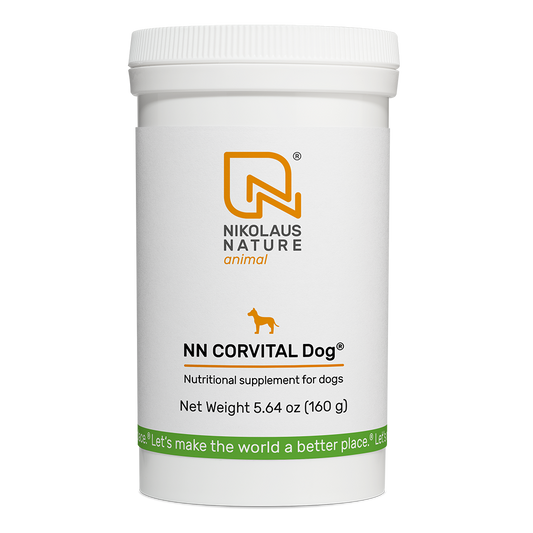Holistic Diet for Dogs with Liver Disease
Did you know that liver disease can affect dogs of any age? But, it is most commonly seen in middle-aged and older pets. Dogs over the age of five are especially at risk, with an even higher prevalence in dogs over eight.
If your dog has been diagnosed with liver disease, it’s natural to feel overwhelmed. What should they eat? What should they avoid? Is there a way to help them feel better through their diet?
Keep reading to learn how the right holistic diet can make a world of difference. We’ll explore the best foods to include, what to avoid, and practical tips for creating a balanced meal plan tailored to your dog's specific needs.

Understanding Liver Disease in Dogs
The liver is one of the hardest-working organs in your dog’s body. It performs over 500 important functions.
For example, the liver filters toxins, produces bile for digestion, stores vitamins & minerals (like A, D, E, K, and B12), and supports the metabolism of fats, proteins, and carbohydrates.
But when this vital organ is compromised, it can lead to serious health issues like cirrhosis and liver failure.
What is Liver Disease in Dogs?
Liver disease occurs when the liver cannot effectively perform its functions due to damage or dysfunction. A few causes of liver disease in dogs include infection, exposure to toxins, genetic predispositions, or long-term inflammation.
The liver is a unique organ because it can regenerate itself, but if the damage is too severe or ongoing, the organ struggles to keep up leading to sometimes irreversible conditions like liver failure.
Types of Liver Disease in Dogs
Liver disease can take many forms, each affecting your dog in different ways. Below are the common types of liver disease seen in dogs:
Hepatic Lipidosis (Fatty Liver Disease)
Hepatic lipidosis occurs when excess fat builds up in the liver, disrupting its normal functions.
Studies show that this condition is particularly common in obese dogs, especially if they stop eating for a few days, and those experiencing rapid weight loss due to illness or poor diet. Without proper management, this condition can worsen quickly, leading to liver failure.
Chronic Hepatitis
Chronic hepatitis is long-term inflammation of the liver, which may result from infections, autoimmune disease, or genetic conditions. Over time, chronic inflammation can cause irreversible damage, leading to scarring (fibrosis) or cirrhosis.
Certain breeds, like Beagles, Labrador Retrievers, and Cocker Spaniels, are more prone to developing this condition.
Research suggests that copper-associated hepatopathy, a condition linked to excessive copper accumulation in the liver, contributes significantly to chronic hepatitis in certain breeds.
For example, Bedlington Terriers are particularly susceptible due to a genetic mutation affecting copper metabolism. Treatment typically involves dietary copper restriction, chelation therapy, and anti-inflammatory medications to help reduce damage and scarring.
Cirrhosis and Liver Fibrosis
Cirrhosis is the end stage of chronic liver damage, where healthy liver tissue is replaced with scar tissue (fibrosis).
Advanced cirrhosis is associated with complications such as portal hypertension (increased pressure in the liver’s blood vessels), ascites (fluid accumulation in the abdomen), and hepatic encephalopathy (brain dysfunction due to toxin buildup).
It can be managed by palliative care, including medication to reduce portal hypertension, diuretics for ascites, lactulose for encephalopathy, and dietary changes to reduce protein load.
Liver Tumors
Liver tumors in dogs are either primary (originating in the liver) or secondary (spreading from other organs).
Among primary tumors, hepatocellular carcinoma (HCC) is the most common form. HCC often presents with vague clinical signs, including lethargy, jaundice, and weight loss, making diagnosis challenging until the disease is advanced.
Studies suggest that surgical removal is the treatment of choice for localized, non-metastatic HCC, with perioperative survival rates exceeding 92–93% in cases where complete resection is achieved leading to excellent long-term outcomes.
Emerging therapies like Trans-Arterial Chemoembolization (TACE) or immunotherapy have shown promise in recent veterinary trials for inoperable tumors.
Benign tumors, such as hepatocellular adenomas, generally have a better prognosis but require monitoring to detect malignant transformation.
Symptoms of Liver Disease in Dogs
Liver disease can show up in different ways, and some symptoms might seem mild at first. If you notice any of these signs, it’s important to consult your veterinarian right away.
Loss of Appetite, Vomiting, and Diarrhea
- Your dog may stop eating or seem less interested in food altogether.
- Vomiting can happen frequently, especially after meals.
- Diarrhea, sometimes with a pale or greasy appearance, might occur due to poor digestion caused by liver dysfunction.
Jaundice (Yellowing of the Skin and Eyes)
- One of the clearest signs of liver problems is jaundice, where the skin, eyes, or gums turn yellow.
- This happens because the liver isn’t processing bilirubin properly, and it starts buildup in the blood.
Lethargy and Weight Loss
- Dogs with liver disease often seem unusually tired or weak, even after resting.
- Weight loss is common, as their body struggles to absorb nutrients or process food effectively.
Increased Thirst and Urination
- Polydipsia (Increased Thirst): You may notice your dog drinking more water than usual.
- Polyuria (Increased Urination): This results from the liver’s reduced ability to concentrate urine and manage fluid balance.
Abdominal Distension from Ascites
- The liver is responsible for producing albumin which maintains hydrostatic pressure in the blood vessels. When in dysfunction, albumin levels decline and excess fluid can leak from vessels into the abdominal cavity.
- Portal hypertension can also lead to fluid build up in the abdominal cavity.
By keeping an eye on these symptoms and acting early, you can help your dog get the care they need before the condition worsens.
The Role of Diet in Managing Liver Disease
When a dog is battling liver disease, what they eat can make a huge difference. The liver has an amazing ability to heal and regenerate, but it needs the right support from a carefully balanced diet.
An ideal diet helps reduce the liver's workload, minimizes toxins in the body, and provides essential nutrients to promote healing and overall health.
Why a Holistic Diet is Crucial for Dogs with Liver Disease
A holistic diet focuses on natural, wholesome ingredients that support the liver while improving your dog’s overall well-being. Since the liver processes everything your dog eats, feeding them the wrong foods can worsen the condition.
For example, diets high in processed ingredients (e.g., artificial preservatives) or containing certain toxins (e.g., aflatoxin) can overload the liver, making it have to work harder to function.
A holistic approach is about more than just avoiding harmful ingredients; it’s about adding the right nutrients to promote healing.
Foods rich in antioxidants, easily digestible proteins, and liver-friendly vitamins can strengthen the liver and even slow the progression of liver disease.
Plus, it can improve your dog’s energy levels and reduce symptoms like vomiting and diarrhea.
Key Nutrients for Liver Health
When creating a diet for a dog with liver disease, certain nutrients are essential for supporting their recovery:
High-Quality Proteins (Easily Digestible)
Dogs with liver disease still need protein, but too much or the wrong type can worsen their condition by increasing ammonia levels in the body. Choosing the right proteins ensures adequate amino acid intake without overburdening the liver.
Ideal Sources:- Eggs: These are considered the most bioavailable source of protein, meaning they’re easy for the body to digest and utilize.
- White Meats: Chicken, turkey, and white fish like cod or tilapia are lean and low in copper, making them gentle on the liver.
- Cottage Cheese: Cottage cheese can be included in small amounts as they are low in ammonia-producing amino acids.
- Red meats like beef or lamb, as they are harder to digest and higher in copper.
- Organ meats such as liver, can be particularly harmful in dogs with copper-associated hepatopathies.
Low Copper Content
Excess copper can accumulate in the liver, causing or worsening liver damage. This is especially problematic in breeds like Labrador Retrievers, Bedlington Terriers, and West Highland White Terriers, which are genetically predisposed to copper storage disease.
Copper-Friendly Foods:- Chicken, turkey, rice, oatmeal, and potatoes are excellent low-copper options.
- Dog foods labeled as “low copper” are formulated for dogs with liver disease and can simplify meal planning. These can include prescription diets like Hill’s L/D.
- High-copper foods such as liver, shellfish (e.g., lobster, oysters), legumes (e.g., beans and lentils), and dark leafy greens like spinach.
Healthy Fats (Omega-3 Fatty Acids)
Not all fats are harmful. Omega-3 fatty acids are beneficial for dogs with liver disease because of their anti-inflammatory properties and ability to provide energy without overwhelming the liver.
Sources of Omega-3s:- Fish oil
- Flaxseed oil or chia seeds are plant-based alternatives.
- Sardines or mackerel in water (avoid those packed in oil or with added salt).
- Reduces inflammation in the liver.
- Supports overall immune health and helps prevent further cellular damage.
Essential Vitamins (B12, K, E)
Liver disease often causes deficiencies in vitamins due to impaired nutrient absorption or liver dysfunction. These vitamins are vital for recovery and should be supplemented when necessary.
Vitamin B12 (Cobalamin):
- Supports energy metabolism and red blood cell production. Dogs with liver disease may develop anemia or lethargy if deficient.
- Sources: Eggs, fish, and vitamin B12 injections for advanced cases.
Vitamin K:
- Important for blood clotting, as liver dysfunction can lead to clotting disorders.
- Sources: The best source may be a Vitamin K1 chewable tablet or capsule your pet can take.
Vitamin E:
- A potent antioxidant that protects liver cells from oxidative stress caused by toxins and inflammation.
- Sources: Fish oil, sunflower seeds (small quantities), or vitamin E capsules specifically formulated for pets.
Sodium Control
Dogs with liver disease, particularly those with ascites (fluid buildup in the abdomen), benefit from a low-sodium diet to reduce water retention.
- Low-Sodium Foods: Home-cooked meals with no added salt, plain boiled chicken, and sweet potatoes.
- What to Avoid: Commercial treats, processed meats, and canned foods with high sodium content.
Types of Dog Food for Liver Disease
Choosing the right food for a dog with liver disease is one of the most important steps in their care. Whether you prefer commercial options or homemade meals, the goal is to provide food that’s easy on the liver, nutrient-dense, and supportive of healing.
Commercial Dog Food for Liver Disease
Commercial dog foods specifically designed for liver health can be a convenient and effective option. These diets are often carefully formulated to include the right balance of nutrients while excluding harmful ingredients like high levels of copper or lower-quality proteins.
Dry Dog Food for Liver Disease
Dry dog food is a practical choice for many pet owners due to its longer shelf life and ease of storage.
Popular options include prescription dry diets formulated for liver support. Brands like Hill’s Prescription Diet l/d, Royal Canin Hepatic, and Purina Pro Plan Veterinary Diets Hepatic are common choices that have undergone rigorous clinical testing to ensure their ability to promote liver health.
While they may cost more than regular kibble, they’re specially designed to address the needs of dogs with liver disease. Always consult your vet before switching to one of these foods.
Hepatic Wet Dog Food
Wet food is often easier for dogs with liver disease to digest, especially if they’re struggling with appetite or chewing.
Hepatic wet dog food provides the same benefits as dry food but with added moisture, which can help dogs stay hydrated—a critical factor when dealing with liver disease.
It’s great for picky eaters since wet food tends to have a stronger smell and flavor.
Homemade Food for Dogs with Liver Disease
If you prefer a hands-on approach, homemade meals can be a great option. They allow you to control every ingredient, ensuring that your dog gets a clean, natural diet without any unnecessary additives. If you prefer homemade meals for your pet, it is necessary to consult with a board-certified veterinary nutritionist to ensure your pet has all the nutrients needed for a balanced diet while keeping in mind the necessary restrictions for a patient with liver disease.
Here are a few key points for making homemade food for liver health:
- Focus on high-quality proteins like eggs, boiled chicken, and white fish (e.g., cod or tilapia). These are gentle on the liver and provide essential amino acids.
- Incorporate liver-friendly carbs like white rice, purple sweet potatoes, or oatmeal for energy without stressing the liver; avoid corn or soy.
- Add healthy fats like fish oil or coconut oil for anti-inflammatory benefits.
- Include antioxidant-rich vegetables like carrots, broccoli, cauliflower, or zucchini, but avoid ones high in copper, such as spinach, kale, and mushrooms.
- Add Supplements like SAMe or milk thistle under your vet’s guidance for added liver support.

Supplements for Liver Disease in Dogs
When managing liver disease in dogs, supplements can play a big role in supporting liver function, promoting healing, and reducing inflammation. While these won’t replace a proper diet or veterinary care, they can work as a helpful addition to your dog’s overall treatment plan.
Here are some of the most effective liver-supportive supplements.
Milk Thistle (Silymarin)
Milk thistle is one of the most well-known natural remedies for liver health in both humans and dogs. Its active ingredient, silymarin, is a powerful antioxidant that helps protect liver cells from damage and supports regeneration.
Benefits:- Shields the liver from toxins by neutralizing free radicals.
- Encourages the growth of new liver cells, aiding in repair.
- Reduces inflammation, which is common with liver disease.
Milk thistle is available as a powder, liquid, or capsule, making it easy to add to your dog’s diet. It is a part of many commercial liver support supplements, such as Denemarin. Always check with your vet for the right dosage, as it depends on your dog’s weight and specific condition.
SAM-e (S-Adenosylmethionine)
SAM-e is another excellent supplement for dogs with liver disease. It’s a naturally occurring compound that supports liver cell function and acts as a strong antioxidant.
Benefits:- Promotes detoxification by boosting glutathione levels, a key antioxidant produced in the liver.
- Helps repair liver cells and prevents further damage.
- Can improve energy levels in dogs, as SAM-e also supports brain health.
This supplement is typically given on an empty stomach for better absorption. It’s often included in prescription liver-support formulas or sold as a standalone supplement.
Probiotics
The liver and gut are closely connected, so keeping your dog’s gut healthy can positively impact liver function. Probiotics help maintain a healthy balance of gut bacteria, which reduces the burden on the liver.
Benefits:- Reduces toxins produced by harmful gut bacteria, easing the liver’s workload.
- Improves digestion, which can be affected by liver disease.
- Supports overall immunity, helping your dog fight off infections.
Look for canine-specific probiotics as each species has a different ideal microbiome.
Vitamin E and B12 Supplements
Vitamin E:- Acts as a potent antioxidant, protecting liver cells from damage caused by inflammation and free radicals.
- Improves overall liver function by reducing oxidative stress.
- Often combined with other liver-supportive treatments for maximum benefit.
- Essential for energy production and red blood cell formation, especially when the liver is struggling to process nutrients.
- Helps boost appetite and energy levels in dogs with liver disease.
These vitamins are often included in multivitamin supplements designed for liver health, but your vet might recommend them separately based on your dog’s needs.
How to Create a Holistic Diet Plan for Your Dog with Liver Disease
Designing the right diet for a dog with liver disease takes thought, care, and expert guidance. A holistic diet plan doesn’t just meet your dog’s nutritional needs—it also supports their liver and overall health. Here’s how to craft a plan that works best for your furry friend.
Consulting Your Veterinarian
Before making any changes to your dog’s diet, talk to your veterinarian. If you are planning to use a solely homemade diet, you will need to consult specifically with a board-certified veterinary nutritionist. Liver disease varies greatly in severity and type, so having a professional assessment is essential.
Here’s why involving your vet is so important:
- Accurate Diagnosis: Your vet can identify the stage of liver disease and any underlying conditions that may influence their diet needs.
- Specialized Testing: Blood tests, ultrasounds, or biopsies can guide dietary recommendations by showing how well the liver is functioning.
- Nutritional Balance: While you might want to jump straight into feeding homemade meals, a veterinary specialist can help ensure the diet includes all the necessary nutrients.
- Supplements and Medications: Some liver conditions require supplements like SAM-e or milk thistle, which work best alongside a supportive diet.
Diet Customization Based on Liver Disease Stage and Severity
Once you know more about your dog’s condition, you can begin tailoring their diet. Liver disease isn’t a one-size-fits-all issue, so every diet should match the stage and severity of the disease.
Early-Stage Liver Disease:
- Focus on a balanced diet that includes high-quality, easily digestible proteins like chicken, fish, or eggs.
- Incorporate omega-3 fatty acids and antioxidants to prevent further damage.
Moderate Liver Disease:
- Limit protein to reduce the buildup of ammonia in the blood, a common problem with liver issues.
- Include more carbohydrates like rice, oatmeal, or sweet potatoes for energy.
- Use foods with low copper levels to prevent additional liver strain.
Advanced Liver Disease:
- Protein restrictions may need to be more strict; consult your vet to avoid malnutrition.
- Focus heavily on liver-supportive ingredients like fish oil, cooked vegetables, and vitamin E.
- Hydration is important, so you may need to include more wet or liquid-based meals.

Monitoring Your Dog’s Progress with Liver Disease
When your dog is dealing with liver disease, monitoring their progress is important. Liver disease can fluctuate, so it's important to track how your dog is responding to treatment, diet changes, and supplements. This allows you to make adjustments and ensure your dog’s condition doesn’t worsen.
Here’s how to keep an eye on your dog’s progress, and know when to seek help from your vet.
Tracking Changes and Adjustments
The first step in monitoring your dog’s progress is keeping a close record of any changes. Here's what to focus on:
Eating and Drinking Habits:
- Keep track of how much your dog is eating. Loss of appetite is common with liver disease, but if your dog starts eating normally again or shows more interest in food, it's a positive sign.
- Make sure they're drinking enough water—liver disease can sometimes cause dehydration, so note any changes in their water intake.
Energy Levels:
- Fatigue and lethargy are common symptoms of liver disease. As you adjust their diet or introduce supplements, keep a note of their energy levels. If they start playing or being more active, that's a good sign.
Digestive Health:
- Keep an eye on your dog’s stools. If you're feeding a new diet, note whether there’s any change in consistency or color. Healthy stools can indicate that the digestive system is functioning better.
- Watch for signs of vomiting, diarrhea, or other digestive issues. These can be signals that their diet or medication need adjusting.
Physical Appearance:
- Jaundice (yellowing of the skin or eyes) is a sign that the liver is under stress. If the jaundice worsens, it could be a sign of deteriorating liver function. However, if the yellowing starts to fade, it's a sign that treatment is helping.
- Keep an eye on their coat and skin—liver disease can cause hair loss or thinning, so improvements in coat condition might indicate that their condition is stabilizing.
Signs of Improvement or Worsening
Knowing what to look for in terms of improvement or worsening is key to managing liver disease in dogs.
Here's what to watch for:
Signs of Improvement
- Increased Appetite: If your dog is eating more and showing interest in food again, it's a sign their liver function may be improving.
- More Energy: A dog with liver disease may seem sluggish and weak, but as they start to recover, you’ll notice more enthusiasm for walks or play.
- Healthier Coat: As the liver gets healthier, your dog's coat might become shinier and less dry. They might also shed less than before.
- Normal Urination: If your dog is drinking and urinating at a normal rate again, it may mean their liver is functioning better.
Signs of Worsening
- Jaundice: If the yellowing of your dog’s skin or eyes gets worse, it could mean that their liver function is deteriorating.
- Increased Lethargy: If your dog becomes more lethargic, less responsive, or loses interest in activities they once enjoyed, this could be a red flag.
- Digestive Issues: Continued vomiting, diarrhea, or refusal to eat can suggest that the liver is struggling to process food and toxins properly.
- Swelling or Ascites: Fluid buildup in the abdomen can occur when the liver isn’t working correctly. If your dog’s belly becomes swollen or tight, seek immediate vet attention.
Remember, liver disease can be progressive, so signs of worsening might require changes in treatment, diet, or medication. If you notice any of these signs, it’s essential to consult your vet right away to avoid further complications.
Conclusion
Taking care of a dog with liver disease is no small task, but with the right approach, you can make a real difference in their health and happiness. Remember, a liver-support diet, the right supplements, and regular monitoring are key to managing this condition effectively. It’s not just about feeding them right—it’s about giving them the best chance for a longer, healthier life.
Are you ready to make those changes for your dog’s health and see the difference it makes? After all, they’re not just pets—they’re family. Keep pushing forward, and let your dog feel the love you’re putting into their care.
FAQs
What do you feed a dog with liver problems?
Feed your dog easily digestible proteins like chicken, turkey, or eggs, along with a liver-friendly diet low in fat and copper. Consult your vet for a tailored feeding plan that includes liver-supporting nutrients and supplements.
How to reverse liver damage in dogs?
Liver damage in dogs can’t always be fully reversed, but early treatment with a special diet, medications, and supplements can help slow down the damage and improve liver function.
Is rice ok for dogs with liver disease?
Yes, rice is safe for dogs with liver disease. It’s easy to digest and can provide energy without putting strain on the liver, but it should be part of a balanced diet.
How can I slow down my dog's liver failure?
To slow liver failure, feed a special diet, provide prescribed medications, and use liver-support supplements. Regular vet checkups and blood tests are essential for monitoring and adjusting care.
Are certain dog breeds more prone to liver disease?
Yes, breeds like Bedlington Terriers, Cocker Spaniels, and Labrador Retrievers are more prone to liver disease. Regular vet checkups are important for early detection and management.
Sources:
- Liver biochemical and histopathological findings in dogs, https://pmc.ncbi.nlm.nih.gov/articles/PMC1142130/
- Canine Chronic Liver Disease, https://www.vin.com/apputil/content/defaultadv1.aspx?pId=12886&catId=57100&id=7054653
- Bedlington Terrier, https://www.sciencedirect.com/topics/pharmacology-toxicology-and-pharmaceutical-science/bedlington-terrier
- Hepatocellular carcinoma, https://www.vet.upenn.edu/docs/default-source/ryan/oncology-handouts/liver-tumors-in-veterinary-patients.pdf?sfvrsn=4
- Comparative Oncology, https://www.mdpi.com/2306-7381/9/9/489
- Embolization or chemoembolization in dogs with hepatocellular carcinoma and utility of contrast-enhanced ultrasound, https://www.vet.upenn.edu/research/clinical-trials-vcic/all-clinical-trials/clinical-trial/
- Omega-3 fatty acids, hepatic lipid metabolism, https://pubmed.ncbi.nlm.nih.gov/23862644/
- Dietary Broccoli Lessens Development of Fatty Liver and Liver Cancer, https://pubmed.ncbi.nlm.nih.gov/26865652/
- Milk Thistle Shows Promising Applications In Treating Liver Disease, Cancer, https://www.veterinarypracticenews.com/milk-thistle-shows-promising-applications-in-treating-liver-disease-cancer/
- S-Adenosyl-L-Methionine for the Treatment of Chronic Liver Disease, https://pmc.ncbi.nlm.nih.gov/articles/PMC4361566/
- Growing evidence that probiotics are good for your liver, https://www.sciencedaily.com/releases/2018/04/180423085445.htm







